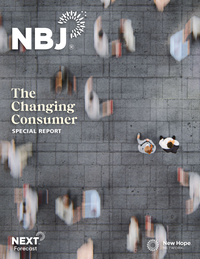How the supplement industry can broaden its customer base
They key to supporting increased accessibility to dietary supplements and other healthy products may be about understanding who you aren’t serving—and challenging that with smart strategies to reach new consumers.

Since the days of DSHEA grassroots advocacy—think mobilizing consumers to write letters and call legislatures in order to ensure access to alternative health products—the dietary supplement industry has excelled at challenging the status quo. Yet, for an industry built around “access” it’s falling short on expanding its consumer base. Natural products and supplements are becoming increasingly mainstream, but there are still major holes in nutrition’s marketing strategy that neglects prospective customers.
“A lot of brands have their ideal customer, especially the healthy product brands. What I want to try to bring about with this industry is there doesn’t need to be this one ideal customer,” says Cole Riley, founder and CEO of nonprofit Wellfare. “What about when a single mom in a poor neighborhood buys your products? That has a huge impact—and that can be an ideal customer. You can have multiple ideal customers. Does it mean you have to go out of your comfort zone, out of your pricing model? Marketing in neighborhoods where you don’t normally sell products? Yes, that’s a challenge.”
While market and environmental forces boosted supplement sales at an unprecedented rate, Nutrition Business Journal’s special report on The Changing Consumer reveals that this didn’t bring new loyal customers into the fold. Failing to bring in new supplement users means the industry isn’t expanding its reach and making products more appealing and accessible to new demographics. This probably won’t translate to sustained industry growth—and it certainly won’t challenge the nutrition industry paradigm, still arguably rooted in wealth and privilege. NBJ describes what we’re seeing as a “nation of ‘take as needed’ rather than a host of the converted.”
According to the report:
We know sales of supplements in the U.S. market climbed at a historic rate in 2020, rising at 14.5 %, but that didn’t mean there is a huge shift in how people approached supplements. Neither the percentage of people who say they “never” tale supplements nor the percentage of people who say they take supplements more than once a day are significantly different.
At the same time, generational dichotomies are more pronounced than ever, and the supplement industry must figure out how to speak the millennial and Gen Z language. Supplements is an “industry largely built by and for baby boomers that is now tasked to understand the beliefs, values and convictions of millennials and Gen Z, while catering to Gen X as the latter navigates middle age,” reports NBJ.
One of the greatest areas of opportunity, which also comes with great challenges, is in reaching these Gen Z shoppers. These progressive shoppers don’t think they need supplements. According to NBJ, most Gen Z shoppers believe that they can get all the nutrients they need from food. This is a common and growing hypothesis among younger consumers, which doesn’t factor in our fractured food system that leaves many diets deficient in key nutrients. Plus, even well-rounded diets fall short in some areas based on dietary preferences, access to certain foods and more.
It's a preconception that needs to be thoughtfully debunked. The supplement industry must figure out how to rally around a common message of nutrition empowerment—and do it without defensiveness. Here also lies an opportunity to partner with the food and beverage market, as opposed to pitting the two complementary industries against each other.
Friction also exists around how Gen Z consumers define product efficacy—and how supplements deliver on it. Dietary supplements are meant to support consumers early and proactively, yet prevention may not resonate with young shoppers who measure health based on how they feel physically and emotionally (if they feel fine now, why take supplements?).
Not just the experiential, but also the emotional aspect resonates with the Gen Z shopper, requiring the supplement industry to connect with these shoppers on a deeper level. Around no condition is this more apparent and needed than mood and mental health, which are top of mind for today’s consumers. In 2017, 34% of consumers put mood and mental health among their biggest health concerns, a number that climbs to 37.6% in 2021.
For a Gen Z shopper, this is about more than product efficacy; it requires a level of emotional intelligence from brands they can trust. In 2017, 38.4% of respondents called the supplement industry “neither trustworthy nor untrustworthy.” In 2021, that segment swells to 49.1%. Talking authentically about issues related to mental health are important for health-oriented companies to build trust. So too is proving social and environmental impact. These aren’t conversations that have come naturally to the supplement industry; but they are commitments that should be core to an industry built around supporting health of people and planet.
Gen Z consumers are asking for brand meaning first, practical value second. Nearly a quarter (23.3%) of Gen Z shoppers reported spending time learning about the mission and values of brands and retailers they buy from, compared with only 10.7% for the boomer-plus crowd. And once they learn about these values from a brand, they’re willing to pay more for them, according to NBJ.
Telling richer stories will help the industry connect with a new generation. But what about reaching more diverse populations across generations? Ultimately, more BIPOC and female founders and board members are needed in order to ensure that this industry meets the unique needs of diverse populations. Both the healthy foods and dietary supplement industry are falling short when it comes to reaching all communities.
According to the report:
Brands and retailers, by and large, are failing to reach significant portions of the population. Non-whites under index on easy access to healthy food—Blacks reporting a full 12 points lower than whites while also reporting seven points lower on feeling “welcome and comfortable shopping at natural products grocery stores.” Blacks and Hispanics also under index on affordability. Again, opportunity abounds in reaching populations of color—populations that share the values of the white populations that have been central to the industry.
The lack of diversity among nutrition industry leaders and boards greatly contributes to this diversity problem. The first Natural and Organic Industry Benchmarking Survey conducted in December 2019 by J.E.D.I Collaborative and New Hope Network reported that black and Latinx membership on industry boards is only 2%, while black and Latinx representation on leadership teams is 2% and 6%, respectively.
Claude Tellis, CEO of nutraceutical company Naturade, recently shared a with the natural products and supplement industry a call to action around supporting diversity in the nutrition industry.
“My call to action is a $50 million call to action. I’d like to see our industry put $50 million in equity into black-owned companies. I’d like to see $50 million in marketing money towards black owned companies. I’d like to see the community lose 50 million pounds and I’d like to see everyone donate $50 million worth of product. I know that together we can solve health care costs, and we can bring the heart and the love from our industry and pour it out to the people who need our products the most.”
In a world where Gen Z is willing to pay more for products that demonstrate their JEDI commitments, the supplement industry’s lack of diversity is further compounding its barriers in connecting with an entire generation. And while the pandemic led to unprecedented supplement sales, the only way for the industry’s growth to be truly sustainable is by addressing these systemic issues and serving more consumers more holistically.
 To learn more about the challenges and opportunities for reaching the new consumer in 2022, access the entire Nutrition Business Journal The Changing Consumer Special Report here.
To learn more about the challenges and opportunities for reaching the new consumer in 2022, access the entire Nutrition Business Journal The Changing Consumer Special Report here.
About the Author(s)
You May Also Like




